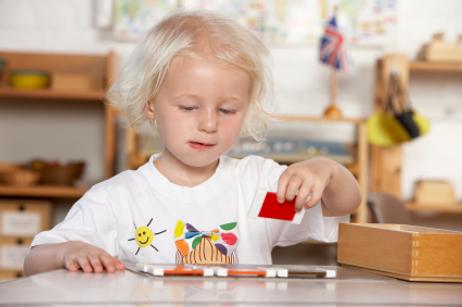While the Montessori Method has been quite popular in early education, more and more public charter schools from kindergarten through middle school are adopting Maria Montessori’s philosophies as well. In fact, there are more than 300 public schools in the United States that currently utilize the Montessori Method, and specifically, there are 150 Montessori charter schools. In an age of standardized tests and intense academic pressure, it seems that a growing group of parents and children are turning towards the Montessori Method.
What is the Montessori Method?
In a stark contrast to our traditional education model, the Montessori philosophy is a more holistic, individualized approach that places an emphasis on “following the child.” One-age classrooms are replaced by multi-age environments, and the prevalence of paper and textbooks is traded for multi-sensory educational tools. Instead of adhering to strict lesson plans, children are allowed to select their curriculum, spending as much time as needed in mastering the subject matter.
In addition, unlike traditional schools, Montessori schools do not believe in issuing report cards with numbers or grades, as outlined by the North American Montessori Teachers’ Association (NAMTA). Progress is not measured through quantified numbers, but rather through a “reporting and record keeping system” that details observations made throughout the quarter. Rather than seeing an “A” grade for math or a “B” for science, parents of Montessori students will see qualitative evaluations on the report cards for variables including attitude, sense of order, curiosity, concentration, persistence, decision-making skills, and self-discipline.
While the average private Montessori school may charge anywhere from $5,000 to $11,000 annually for tuition, public Montessori charter schools give students the same educational philosophy for free. Like their private counterparts, many Montessori public schools supplement the academic curriculum with music and art classes, language courses, and nature-based lessons.
How are Montessori Charter Public Schools Performing?
While every Montessori charter public school is measured by its own state’s standardized tests, research on Montessori student performance is quite promising.
According to the Association Montessori International (AMI), children who learn under the Montessori Method perform quite well academically and on standardized tests. In an AMI research study evaluating the progress of 201 Milwaukee public school students who had been educated in Montessori schools from preschool through 5th grade, the results were quite positive. In fact, according to the report’s findings, “…attending a Montessori program from the approximate ages of three to eleven predicts significantly higher mathematics and science standardized test scores in high school.”
In addition, the research finds that the benefits of a Montessori education extend beyond better science and math scores. In a study that compared inner-city Montessori students with inner-city traditional students, those who attended Montessori schools developed “better social and academic skills” and “superior outcomes” as reported in the academic journal Science. At the kindergarten level, Montessori students obtained better scores in reading and match, displayed more developmentally advanced control and social understanding, as well as played more positively with their peers. At the elementary school level, the Montessori students had a stronger grasp of complex sentence structures and a better understanding of social dilemmas.
In a study sponsored by the North American Montessori Teachers’ Association (NAMTA), the impact of a Montessori education at the middle school level was substantial in improving the “quality of experience” for the students. Dr. Rathunde compared the perceptions between Montessori middle school students and those enrolled in traditional middle schools, and the Montessori students reported “a significantly better quality of experience in their academic work than did traditional students.” The Montessori students also felt their schools were more positive learning environments that cultivated active learning, rather than passive or rote learning.
Other research has found that Montessori students enjoy social, emotional, and academic benefits from their education. From demonstrating greater responsibility to a deep enthusiasm for learning, as well as increased abilities to adjust to new situations and utilize life skills, Montessori children appear to be more well-rounded than their traditional school counterparts.
The future may certainly see more Montessori-inspired public charter schools, especially in light of the Obama administration’s support for charter institutions through the “Race to the Top” grants. With all the benefits the Montessori Method can bring, it is no wonder that more and more parents are subscribing to the “follow the child” philosophy.










